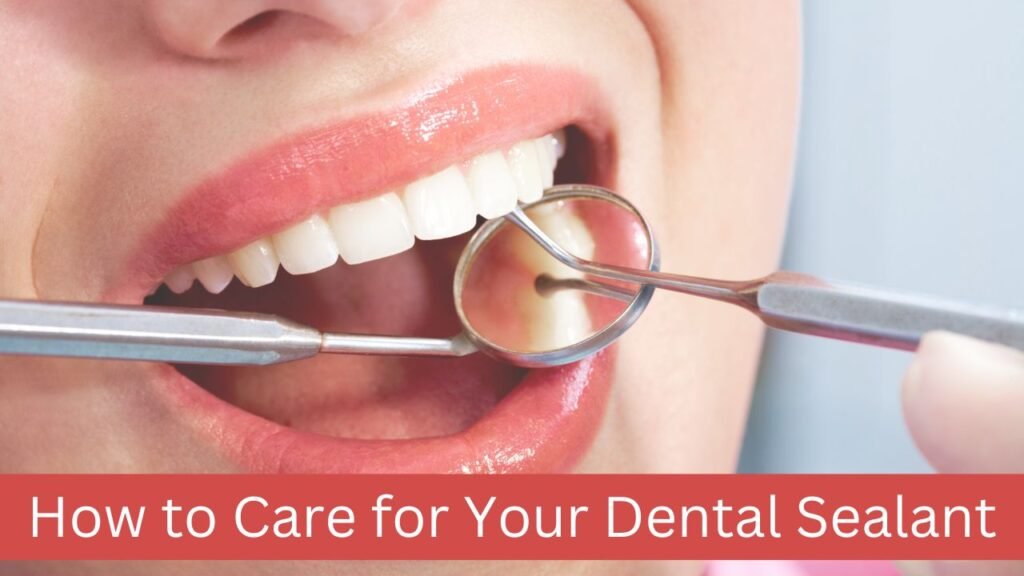- Dental sealants are a protective coating applied to the teeth to prevent cavities and tooth decay.
- Proper oral hygiene, such as brushing and flossing regularly, is essential for maintaining healthy sealants.
- Avoid chewing on hard or sticky foods that can damage or dislodge the sealants.
- Regular dental check-ups and cleanings are crucial for monitoring the condition of the sealants.

Knowing how to care for dental sealants helps protect teeth from cavities and keeps the protective coating strong for years. Proper care prevents damage and supports long-term oral health.
Benefits of Dental Sealants
This Youtube video below from Kansas City University explains the benefits of dental sealants and who may need them. It shows how sealants protect teeth from decay and support preventive care. The overview highlights why sealants remain a smart choice for cavity prevention.
Dental sealants are a popular preventive measure against tooth decay and cavities. They are a thin, protective coating applied to the chewing surfaces of the back teeth, usually the molars and premolars.
This helps to prevent food particles and bacteria from getting trapped in the crevices of the teeth, reducing the risk of tooth decay. If you have recently had dental sealants applied or are considering getting them, it is important to know how to properly care for them to ensure their longevity and effectiveness.
Why Are Dental Sealants Important?
Dental sealants play an essential role in maintaining oral health. They act as a barrier between the teeth and harmful bacteria, food particles, and acids. The chewing surfaces of the back teeth have deep grooves and pits that can easily trap food and bacteria, making them more susceptible to decay. Sealants fill in these grooves, creating a smooth, protective surface that is easier to keep clean.
How to Care for Your Dental Sealants
Practice Proper Oral Hygiene
- Brush your teeth at least twice a day and floss daily to remove plaque and food particles that can cause decay.
- Use fluoride toothpaste and a soft-bristled toothbrush to ensure a thorough clean without causing any damage to the sealants.
Avoid Chewing on Hard Foods
- While sealants are durable, they can still be damaged by excessive chewing on hard foods or objects.
- Avoid biting down on ice, hard candy, or any other hard substances that can potentially chip or dislodge the sealants.
- Refrain from using your teeth as tools to open packages or bottles.
Limit Sticky Foods
- Sticky foods such as caramel, toffee, or chewing gum can get stuck on the surface of the sealants and increase the risk of decay.
- Minimize the consumption of these types of foods or clean your teeth thoroughly after consuming them.
Visit Your Dentist Regularly
- Regular dental check-ups and cleanings are essential for maintaining the health of your sealants.
- Your dentist will monitor the condition of the sealants and make necessary repairs or replacements if needed.
- Regular professional cleanings will help remove any hardened plaque or tartar that can accumulate around the sealants.
Consider Dental Sealant Replacement
- Sealants typically last for several years, but they are not permanent.
- Over time, they can wear down or become damaged.
- If you notice any signs of wear or damage, such as chips or cracks, consult your dentist for a replacement.
- Regular dental examinations will assist your dentist in determining when it is time to replace your sealants.
Maintaining Dental Sealants Table
| Dental Sealant Care | Description |
|---|---|
| Practice Proper Oral Hygiene | Brush your teeth at least twice a day and floss daily using a soft-bristled toothbrush and fluoride toothpaste. |
| Avoid Chewing on Hard Foods | Refrain from biting down on hard foods, ice, or non-food objects that can potentially damage the dental sealants. |
| Limit Sticky Foods | Minimize consumption of sticky foods that can get stuck on the sealants and increase the risk of decay. |
| Visit Your Dentist Regularly | Schedule regular dental check-ups and cleanings to monitor the condition of the sealants and remove any built-up plaque or tartar. |
| Consider Dental Sealant Replacement | If you notice any signs of wear or damage, consult your dentist for a replacement. |
Frequently Asked Questions
Can Dental Sealants Be Applied on All Teeth?
Dental sealants are typically applied to the permanent molars and premolars as they are most prone to decay. However, in some cases, they may also be applied to other teeth based on the individual’s risk of cavities.
Are Dental Sealants Only for Children?
While dental sealants are commonly applied to children’s teeth, adults can also benefit from them, especially if they have deep grooves or are at a higher risk of cavities.
Do Dental Sealants Hurt?
No, getting dental sealants is a painless and non-invasive procedure. The tooth surface is cleaned and prepared before the sealant is applied, which does not cause any discomfort.
How Long Do Dental Sealants Last?
Dental sealants can last several years with proper care. Regular dental check-ups will help ensure they remain effective and can be replaced when necessary. Typically, sealants last between 5 to 10 years, but this can vary based on factors like oral hygiene and eating habits.
Resources:
- American Dental Association: Dental Sealants
- Healthline: What Are Dental Sealants?
Find Your Perfect Dentist
Easily book appointments with top-rated dentists in your area
Need Emergency Dental Care?
Get immediate help from verified dental professionals